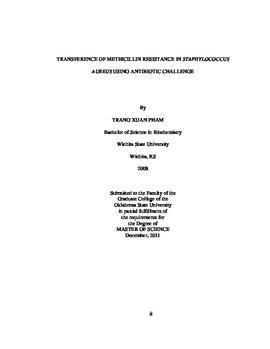| dc.contributor.advisor | Glass, Richard Tom | |
| dc.contributor.author | Pham, Trang Xuan | |
| dc.date.accessioned | 2014-04-17T20:11:54Z | |
| dc.date.available | 2014-04-17T20:11:54Z | |
| dc.date.issued | 2011-12-01 | |
| dc.identifier.uri | https://hdl.handle.net/11244/10307 | |
| dc.description.abstract | The specific aim of this study was to document the transfer of a functional methicillin resistance gene, mecA , from methicillin resistant Staphylococcus aureus (MRSA) genomic DNA to methicillin sensitive Staphylococcal aureus (MSSA) thereby converting MSSA to MRSA. The experimental approach included the characterization of Staphylococcus aureus strains using Gram stain, coagulase and mannitol salt agar tests. Included among the Staphylococcus strains analyzed were 18 de-identified MRSA hospital isolates, nine MSSA strains isolated from band musical instruments and mouth-guards studies, and one MSSA strain of unknown origin. Additionally, sensitivity profiles of each strain were determined by minimum inhibitory concentration (MIC). Detection of mecA gene involved amplification by polymerase chain reaction (PCR) using fluorescently tagged primers and capillary electrophoresis with an ABI Prism Genetic Analyzer 310. Transformation studies involved the suspension of DNA extracted from two MRSA strains into a MSSA culture containing oxacillin complete with necessary controls. Electroporation was used in an attempt to force transformation, but it too was unsuccessful. Transformation was not observed under the specific test conditions. As a result of the electroporation experiment, growth was observed but no mecA gene was detected. The difficulty in transforming MSSA to MRSA suggests that transformation of SCCmec containing a mecA gene may not readily occur in nature or if so, it may proceed under conditions that were not replicated in vitro. Furthermore, additional analysis of SCC mec containing a mecA gene of the Staphylococcal strains may be necessary to further assess the integration of mecA into a recipient's genome. Lastly, transference of mecA to MSSA may be a result of conjugation or transduction, not transformation. | |
| dc.format | application/pdf | |
| dc.language | en_US | |
| dc.publisher | Oklahoma State University | |
| dc.rights | Copyright is held by the author who has granted the Oklahoma State University Library the non-exclusive right to share this material in its institutional repository. Contact Digital Library Services at lib-dls@okstate.edu or 405-744-9161 for the permission policy on the use, reproduction or distribution of this material. | |
| dc.title | Transference of Methicillin Resistance in Staphylococcus Aureus Using Antibiotic Challenge | |
| dc.type | text | |
| dc.contributor.committeeMember | Allen, Robert W. | |
| dc.contributor.committeeMember | Conrad, Robert S. | |
| dc.contributor.committeeMember | Koehler, Gerwald | |
| dc.contributor.committeeMember | Bullard, Jay | |
| osu.filename | Pham_okstate_0664M_11751.pdf | |
| osu.college | Center for Health Sciences | |
| osu.accesstype | Open Access | |
| dc.description.department | School of Forensic Sciences | |
| dc.type.genre | Thesis | |
| dc.subject.keywords | meca | |
| dc.subject.keywords | mrsa | |
| dc.subject.keywords | staphylococcus aureus | |
| dc.subject.keywords | transformation | |
